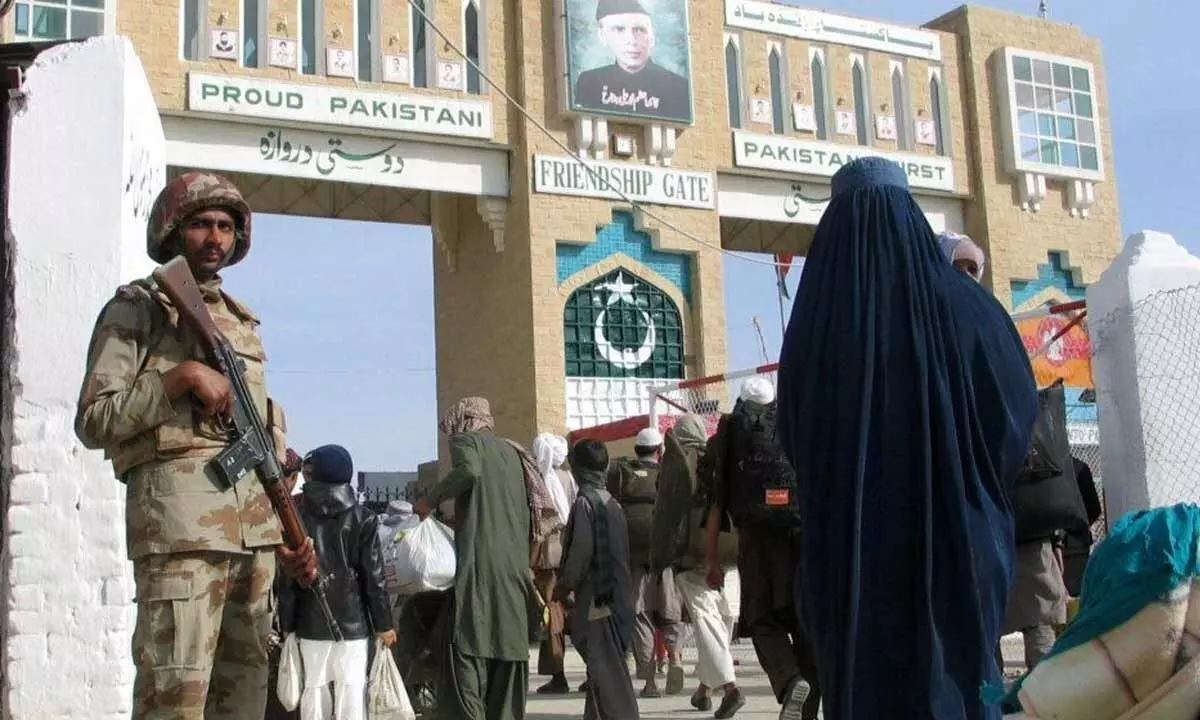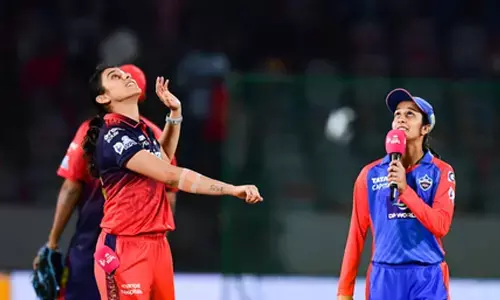New cross-border terror far more audacious

New cross-border terror far more audacious
The two ghastly incidents of Islamic terrorists slitting the throat of a Hindu target at Amravati in Maharashtra and the beheading of another at Udaipur in Rajasthan a week later, in full public view after delivering an open threat in both cases for the support voiced by the victims on social media for now suspended BJP spokesperson Nupur Sharma for her remarks on Prophet Muhammed made during a TV debate, indicate a new level of threat to India's internal security from radicals manoeuvred by a hostile Pakistan.
The two ghastly incidents of Islamic terrorists slitting the throat of a Hindu target at Amravati in Maharashtra and the beheading of another at Udaipur in Rajasthan a week later, in full public view after delivering an open threat in both cases for the support voiced by the victims on social media for now suspended BJP spokesperson Nupur Sharma for her remarks on Prophet Muhammed made during a TV debate, indicate a new level of threat to India's internal security from radicals manoeuvred by a hostile Pakistan.
In both cases, the terror act was preceded by meticulous planning negating the view that these events of raw violence could be attributed to 'sudden and grave provocation' linked directly to what the party functionary of BJP had said.
Many people in the legal profession have disagreed with the judicial observations made by the apex court while throwing out the request of the 'accused' former BJP spokesperson to club together the numerous cases filed against her on the same count.
In essence, the court held Sharma directly responsible for the Udaipur beheading of a hapless Hindu tailor. Can it be said that what the BJP representative gave out by way of a 'spoken' word -- for which a set of laws is already being applied -- was good enough for a group of people to plan physical violence of gruesome murder of two Hindus for merely agreeing to her remarks?
The socio-political environ -- howsoever bad -- cannot legitimise resorting to a medieval kind of public violence. The state in democratic India must punish these 'terrorists' on a deterrent note for the sake of its internal security and go all out to uncover the wider conspiracy behind these events involving India's adversaries, for an equally effective response.
In India, all religions are on the same footing as far as respecting the sensitivities of their followers is concerned and no community could claim to be on a different pedestal from others in this regard.
It is now becoming clear in the investigation of these cases by the NIA that the acts of terrorism might be the doing of Pakistani agents who have been guided through the planning, resource mobilisation and modus operandi for carrying them out.
These events should be seen as the culmination of three alarming aspects of cross-border terrorism which became particularly marked ever since Prime Minister Narendra Modi -- known for his tough stand on Pakistan-sponsored terrorism against India -- returned to power for a second term in 2019.
One is the extensive harnessing of Islamic radical outfits by Pak ISI in the proxy war against India in Kashmir and elsewhere -- more so after the abrogation of Article 370 of the Constitution. It was aided by the re-installation of the Taliban Emirate in Kabul in August 2021 that had come about with the full backing of Pakistan.
Secondly, the rise of the anti-Modi lobby comprising elements of the opposition, civil society fora and anti-India forces abroad, with its narratives of majoritarianism, authoritarianism and anti- minority outlook of the regime, has encouraged Pakistan to openly denounce India for promoting Hindutva at the cost of Muslim rights and freedom.
Former Pakistan Prime Minister Imran Khan clearly made this allegation while announcing the National Security Policy of Pakistan. His successor, Shehbaz Sharif, has followed it up with a stepped-up propaganda about suppression of human rights in Kashmir -- this was done in an attempt to draw Pakistan closer to the US once again.
There is an acceleration of attempts by Pakistan to spread radicalisation and raise potential agents in India through clandestine use of social media for creating terror modules taking advantage of the Hindu-Muslim conflicts here.
It may be recalled that following the ban imposed on Students Islamic Movement of India (SIMI) -- a militant communal front of Jamaat-e-Islami Hind -- in 2006, the Indian Mujahideen (IM) emerged as the Jehad front of SIMI that was responsible for several acts of terror subsequently.
IM had strong international links and showed how Islamic terrorism could be whipped out of communal militancy. It is a matter of great satisfaction that India's intelligence setup is fully geared to detect every potential militant linked with Pakistan or any other foreign entity.
The third disquieting development is the stepping up of minority politics by a diminished opposition and its allies for the purpose of garnering electoral numbers -- they campaigned that India under Modi has ceased to be a secular state.
This was done in complete disregard of the fact that the built-in secularism of the Constitution ensured that the democratic principles of one man one vote, development of all and equal protection of law to be provided by state governments, could not be diluted.
The domestic environ is marked by an increased proneness to communal violence and spread of radicalisation. The case of alleged insult of Prophet Muhammed by a BJP functionary is being used by Pakistan to highlight the overriding identity of Indian Muslims as a part of Ummah and bring in OIC in the picture to buttress this -- an unusual demand was made that India as a nation must apologise for what was at best an indiscreet expression of views by a party person about the Prophet in a debate where a Muslim participant was earlier freely insulting Hindu Gods.
The leadership of the minority community here was silent on the 'internationalisation' of a domestic event -- it had every right to take it up with the government and protest against it. The sovereign democratic republic of India cannot be questioned by any country on a matter of internal governance.
There are forces -- home-based and those operating from across the borders -- which are seizing every opportunity of destabilising this country, particularly on inter-community issues. The narrative of majoritarianism and lack of protection of minorities is now being turned into calls for violence and many leaders of the minority community are even putting up with foreign-inspired radicalisation and terror.
It was clear all along that following the success of the anti-Soviet armed campaign in Afghanistan, Pak ISI had planned to replicate the Afghan Jehad in Kashmir and tried sending the first Taliban Mujahideen into the Valley under the cover of Harkatul Ansar in 1993.
It is not surprising that Taliban elements reportedly made an appearance in POK following the recent return of the Kabul Emirate. The militancy in Kashmir is being made an instrument for spreading radicalisation in the rest of the country and stepping up recruitment of terrorists for planned action wherever possible.
The incidents of Amravati and Udaipur have to be seen in this larger backdrop and the strategy of dealing with this threat be reframed for urgent action.
Time has come for taking to zero tolerance against any violence that adds up to a terrorist activity. Stray communal violence and isolated cases of clash among individuals are on a different footing. It is good that the NIA is going into all the aspects of the Amravati and Udaipur cases, including conspiracy as well as the role of local administrators and police officers.
If any political elements are directly involved, no latitude should be shown to them. The Centre needs to demonstrate its political will to legally pursue the matter till its logical conclusion in order to create a deterrence against this kind of dictated violence.
It needs to be mentioned that the average members of any minority community in India have the same concerns of livelihood and security as the ordinary people of the majority community here would face -- they all desire to live in peace.
Democratic India must sternly put down the violence encouraged out of political motives and in particular counter radicalisation fomented by the adversary. Scan of social media has to be enlarged manifold since this has become an instrument of combat and subversion. People have to be made aware that social media is like a public platform which should be used only for legitimate communication and which is subject to do's and don'ts governed by the IT Act. Broadly speaking, one should not use social media for anything that one would not be doing or saying at a public forum. Right to privacy cannot be taken for granted while using social media. Indian citizens need to be also educated on national security in a broad sense and on their contribution to the same for the sake of national unity and integrity as enjoined upon them by the Preamble to our Constitution. The country should stand together against terrorism regardless of internal differences on political or religious issues.
(The writer is a former Director of Intelligence Bureau. The views expressed are personal)














